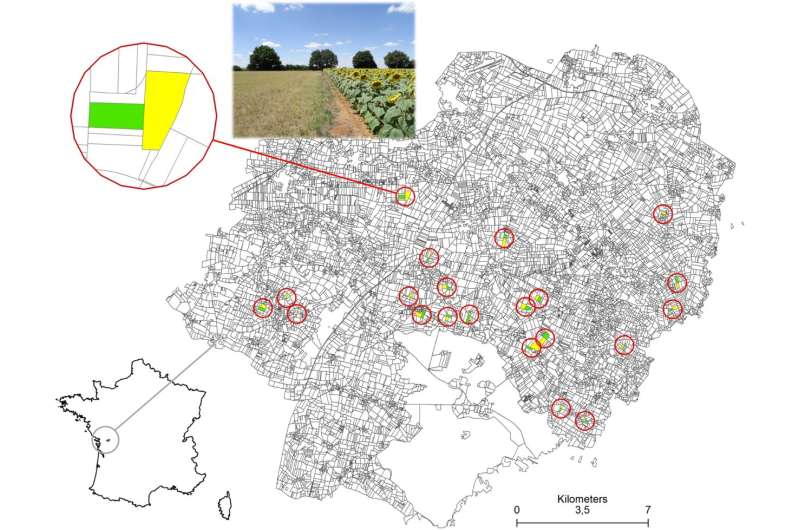This article has been reviewed according to Science X's editorial process and policies. Editors have highlighted the following attributes while ensuring the content's credibility:
fact-checked
trusted source
proofread
Study highlights profitability as a key barrier to biodiversity-friendly farming

A study, published in the Proceedings of the National Academy of Sciences (PNAS), focused on an intensive grassland-sunflower system in southwest France in order to quantify the ecological, agronomic, and net economic benefits of biodiversity-friendly farming. Such insight is highly needed in the context of experts increasingly advocating for biodiversity-friendly farming, with very little known about its economic profitability for farmers.
Researchers discovered that reducing land-use intensity on agricultural grasslands greatly improved flower availability and wild bee diversity, including rare species. Moreover, adopting biodiversity-friendly management resulted in up to a 17% increase in revenue on neighboring sunflower fields due to the positive effects on pollination service delivery.
The effects on profitability however were bleaker—the opportunity costs of reduced grassland forage yields consistently outweighed the economic benefits of enhanced sunflower pollination.
These findings highlight that profitability is a crucial constraint for the widespread adoption of biodiversity-based farming practices, increasing the need for economic rewards for farmers who engage in conservation management.
The study's results also support a key message from SHOWCASE's Policy brief—to effectively address the ongoing global biodiversity crisis, policymakers must acknowledge that farmers cannot be expected to bear the costs of managing their land in a biodiversity-friendly way, while society reaps most of the benefits, such as enhanced wildlife populations, clean water, and reduced greenhouse gas emissions.
Dr. Jeroen Scheper—one of the study's authors—states, "Our results suggest that biodiversity-friendly farming can produce a win-win situation for biodiversity and ecosystem service delivery, but will often require additional public or private payments to become profitable for farmers."
More information: Jeroen Scheper et al, Biodiversity and pollination benefits trade off against profit in an intensive farming system, Proceedings of the National Academy of Sciences (2023). DOI: 10.1073/pnas.2212124120
Provided by Pensoft Publishers


















